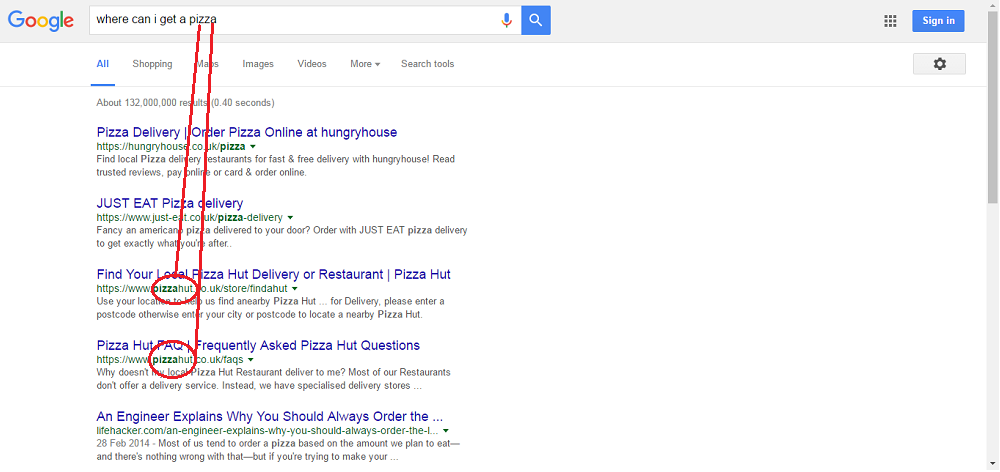Step 1: Deciding on a good and relevant domain name
Deciding on a domain name is always the first thing people think of doing when they want a website but there are a couple of things to consider when you’re doing this and that’s what we are going to discuss.
The last article explained what you should be thinking about and asked you the question “What’s my current situation and why do I want a website anyway?”
Now that you’ve thought about:
- What your business stands for;
- What it does;
- What your customers expect and
- How your website can compliment your existing business offerings.
We can move on to actually getting a website for your business.
Having worked with (and being friends with) a number of different business owners and self-employed, the same things seem to always come up.
All being extensions from the original question asked, “How do I get a website and what do I need to do?” and summed up in the following sentiments:
- “I don’t understand how all these things work (what’s involved in building a website)”
- “I just want a website. I don’t want anything complicated that does lots of things and cost a fortune”
- “I don’t know what I need to do or what I should expect as the normal process”
- “How do I know I’m not being ripped off?”
Hopefully all will be answered in the steps that follow.
Deciding on a domain name that is good and relevant
When it comes to setting up your business website, deciding on a domain name is always the first thing people think of doing and they normally already have a name in mind.
BUT and a BIG BUT
Lots of other people are also looking to get a website and this could mean you end up with one common issue…
You head over to a domain registrar such as Godaddy or 123-Reg, click in the search box, type in the name of a domain you would like for your website and hit search.
You wait a second or two and get a result, a result that p****s you off
“The name that I want to use for my website is already gone!! What should I do now?
Can I use another name that is similar or something else completely different?”
Like I said this is a common issue as a lot of ideas that we think are unique actually aren’t as other people have thought of the same thing, acted on it and bought a domain name before you did.
If you have already setup your company and have a business name this can be annoying as your business name wont match your website address.
Use an acronym of your business name
A way around this is to use the acronym of your company name.
For example, if websideview.com had already been taken, we could have used wsv.com and checked if that was available.
People would still easily relate wsv.com to websideview the business because when you tell them you are using the first letters of each word they can easily remember this.
Be creative with names
Another, way to get around such an issue is to be a little more creative using words that easily relate to your business.
A prime example of this is B&Q the DIY superstore.
Firstly there is no way that they could have used the special character “&” in the name as this is not allowed so they had to think of something different.
Yes you guessed it, they are a DIY store so they used diy.com
Everyone already relates B&Q the brand and DIY store to all things DIY and if they didn’t it was easy for people to remember when explained,
“our website address is diy.com because we supply diy goods for home and garden.”
What you will also find now days is that since lots of companies are now using up names that finish with .com or .co.uk the domain registering companies have now started using others such as .company .education and more. However, be careful when using these extensions as they can still lead to confusion for customers as they are still used to the regular .co.uk and .com.
It’s a little different if you are just setting up a business or setting up working for yourself as you have a little more freedom as you do not already have a brand that people know and recognize.
For this reason you can play around with lots of different names to use for your domain name.
The only bit of advice to remember here is to not use something that is too “left field” and “quirky” as the last thing you want is to have a great name and domain name but find out that people cant even spell it or remember it.
Google isn’t a word as such (well it wasn’t at the time) but it is memorable and easy to spell.
Spotify, Apple, Dell, Godaddy and WebSideView even (viewing the Web from the Side View) are easy to remember and spell.
Don’t forget about Google and Search Engines
Google has changed the way it ranks websites and how it shows search results to people. There are a number of different factors that they have introduced and changed over the years but one thing remains the same
Google searches for words to match searches (alongside other criteria – read here to learn more ).
For Example: Someone is searching for where to get a pizza
When someone types in “where can I get a Pizza” you get the following results:

You will notice that pizzahut.co.uk comes in third position and it contains the word “pizza” in the domain name.
Google looks for words when searching/scanning your website, looking specifically at the domain name, page title and your full site content for matches to what has been typed into that search box.
For that reason it is a good idea to try to use a word or two that someone would naturally search for in your particular area of business. This is not easy to do because most people think of such descriptive words when naming their businesses meaning not many are left these days.
This is a simplified explanation as there are a whole host of other factors that Google uses to decide whether you appear in the search results but doing this can help.
Don’t worry too much about this as there are other tactics you can use that are more fruitful for improving search result ranking, much better than matching the domain name to a search word or two (good to hear, right?).
Choosing a memorable and clear domain name is much more important so:
Keep it catchy, simple and easy to remember.
It’s much more beneficial for people to come to your website directly because they remembered your business and domain name from an advert, Facebook post, leaflet or someone telling them.


3 thoughts on “Step 1: Deciding on a good and relevant domain name”
Comments are closed.